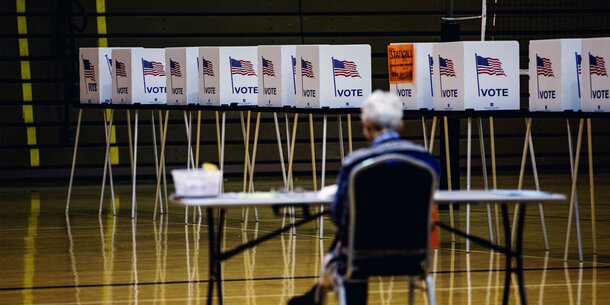Constitutional Protections Against Improper Expulsions
The courts have rarely considered whether legislatures retain the power to expel a member. This is unsurprising: expulsions are so uncommon — and usually are carried out for reasons that relate to a member’s criminal or unethical conduct — that the matter has had few chances to wind up in court.
In 1966, however, the U.S. Supreme Court ruled on a similar question of legislative exclusion in Bond v. Floyd. After Julian Bond, an electee to the Georgia House of Representatives, endorsed a statement opposing the Vietnam War, house leadership asserted that his statement was grounds to deny him admission to the legislative body. The Court unanimously ordered the Georgia house to seat Bond and made clear that the legislature could not ignore nor limit First Amendment free speech rights when it considered excluding an elected official.
Bond presents a close analogy to the expulsions of Jones and Pearson. In its decision, the Court explained that the First Amendment “requires that legislators be given the widest latitude to express their views on issues of policy” without legal repercussions. The principles affirmed in Bond would presumably also bar the legislative removal of two elected representatives for their policy views concerning gun violence.
There was also reason to believe that Bond’s race motivated the Georgia legislature’s decision to exclude him. Bond was a civil rights leader and one of six Black men elected to the Georgia house in 1965 — a group that was among the first Black legislators in the state since the expulsion of 33 Black members because of their race a century earlier. While the Supreme Court resolved Bond’s lawsuit under the First Amendment, the Court acknowledged that nearly all the voters in his district, who were temporarily denied representation because of his exclusion, were Black. Bond’s exclusion may therefore have also violated the 15th Amendment, which prohibits the denial or abridgment of a citizen’s right to vote on account of race — a protection that covers both access to the ballot and adequate representation.
Other cases that have confronted related issues of legislative power provide instruction on how to approach the novel expulsions in Tennessee. They reveal a long-standing recognition by the Supreme Court that legislators must not use their expulsion power to trample free speech, illegally discriminate, or harm minority voters.
In 1892, the Supreme Court recognized in United States v. Ballin that “[t]he Constitution empowers each house to determine its rules of proceedings. It may not by its rules ignore constitutional restraints or violate fundamental rights.” Much like federal law enables an employer to fire an at-will employee for any reason except a discriminatory one, legislatures cannot expel a member for exercising a constitutional right.
Likewise, in the landmark 1962 case Baker v. Carr, the Court held that while state legislatures have express constitutional power to draw electoral districts, those districts must comply with the 14th Amendment’s Equal Protection Clause. In other words, even where the Constitution expressly gives a legislature certain power, other constitutional guarantees may limit the exercise of that power. In 2019, a federal court in Tennessee recognized that expulsions, like lawmaking and redistricting, are a “legislative power.”
In each of these cases, the Supreme Court acknowledges that legislatures have broad powers, including to expel members. But in no case does the Court suggest that the legislature’s right to expel defeats other constitutional rights granted to all Americans, including legislators and the voters who elect them. Expulsion is a power, not a superpower.
One state court recently ruled against the weight of this precedent and refused to hold a legislature accountable for unconstitutionally misusing its authority. In response to a lawsuit filed by Representative Zephyr demanding reinstatement, a Montana court held that separation of powers principles barred it from reviewing the legislature’s decision. The court’s judgment contradicted the well-established mandate that courts be open to all who seek to vindicate fundamental rights. The Baker Court acknowledged that the reach of judicial power extends to state action that results in the denial of constitutional rights. The Bond Court explicitly held that it had jurisdiction to determine whether the Georgia house “deprived Bond of federal constitutional rights.” The upshot is clear: not only may courts decide claims of individuals harmed by the exercise of legislative power — courts must do so if the claim involves a protected right.
In Tennessee, numerous protected rights are at issue. The expulsions punished Jones and Pearson for the viewpoint they expressed, an action that the U.S. Supreme Court regards as presumptively unconstitutional under the First Amendment. Time and again, the Court has recognized that laws restricting or compelling speech based on the view expressed have the potential to expel ideas from public debate. In this case, the legislature’s actions have all the hallmarks of suppressing speech based on its viewpoint. The majority silenced the representatives whenever they attempted to raise the need for gun control legislation. The legislature did not silence those representatives when they sought to speak on other topics.
In addition, the expulsions appear to violate the 14th and 15th Amendments. In Village of Arlington Heights v. Metropolitan Housing Development Corp., the Supreme Court explained that to decide whether a legislative act is intentionally discriminatory, courts should look at several factors, including the act’s discriminatory impact, legislative history, and historical background. An application of the Arlington Heights factors to what happened in Tennessee suggests that race was a motivating factor for the expulsions.
First, a discriminatory impact was present as Jones, Pearson, and Johnson represent districts that are heavily Black and brown. While these expulsions did not prevent Black voters from casting their ballots, they essentially nullified their votes by silencing and removing their duly elected representatives. Second, although the three lawmakers engaged in the same conduct, the legislature treated them differently by expelling the Black members and sparing the white representative.
Third, Tennessee has an incontestable history of slavery, racial segregation, and race discrimination that continues to manifest in the legislature today. Tennessee is the birthplace of the Ku Klux Klan and the site of Martin Luther King Jr.’s murder. Johnson told a news anchor that she “hear[s] racist statements all the time” in the legislature. Illustrating the point, she described hearing one of her colleagues insist that the legislature “should bring back hanging by a tree” during a discussion about a bill to revive certain methods of execution.
On balance, this evidence crystallizes the real motivations for the legislature’s conduct. Johnson recognized this; when asked why she survived the expulsion vote and her colleagues did not, she asserted that the hypocrisy “might have to do with the color of our skin.”
State legislatures have broad power to expel their members, and there are good arguments for why they should have that power. We cannot trust members who take bribes, commit sexual assault, or engage in treason to represent us, and there is no fundamental right to engage in these actions. But freedom of speech and freedom from racial discrimination are protected. Those rights do not cease to exist when one enters through the statehouse doors.
Adriana Monzón contributed research support.




